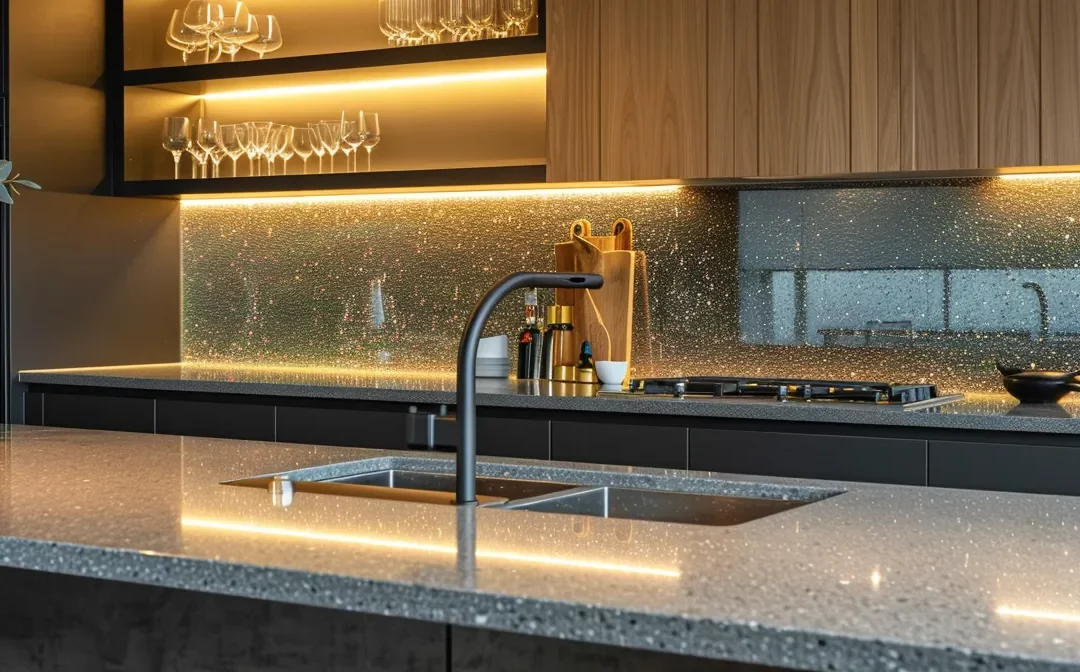Melbourne Bench Top Renovation And Resurfacing Services
Table Of Contents:
- Key Takeaways
- Understanding the Importance of Eco-Friendly Benchtop Renovations
- Top Sustainable Materials for Eco-Friendly Benchtops
- Top Sustainable Materials for Eco-Friendly Benchtops
- Factors to Consider When Choosing Sustainable Benchtops
- Installation Tips for Sustainable Benchtop Materials
- Caring for and Maintaining Your Eco-Friendly Benchtops
- Real-Life Examples of Eco-Friendly Benchtop Renovations
Are you looking to improve your kitchen while also being mindful of sustainability? Eco-friendly benchtop renovation is a smart choice for anyone wanting a stylish and responsible upgrade. In this article, you will discover the best sustainable materials, like cement and recycled options, and explore important factors to consider when choosing your new benchtop. You’ll learn how these changes not only enhance the functionality of your cabinetry but also contribute to sustainable living. If you’re uncertain about how to start, this guide will provide the insights you need to make informed decisions that align with your values.
Key Takeaways
- Sustainable benchtops improve indoor air quality and reduce harmful emissions
- Eco-friendly materials, like bamboo and recycled glass, minimize environmental impact while enhancing aesthetics
- Choosing durable options cuts down on waste and maintenance in your kitchen renovation
- Incorporating locally sourced materials supports the economy and reduces transportation emissions
- Proper installation and care prolong the lifespan of eco-friendly kitchen surfaces
Understanding the Importance of Eco-Friendly Benchtop Renovations
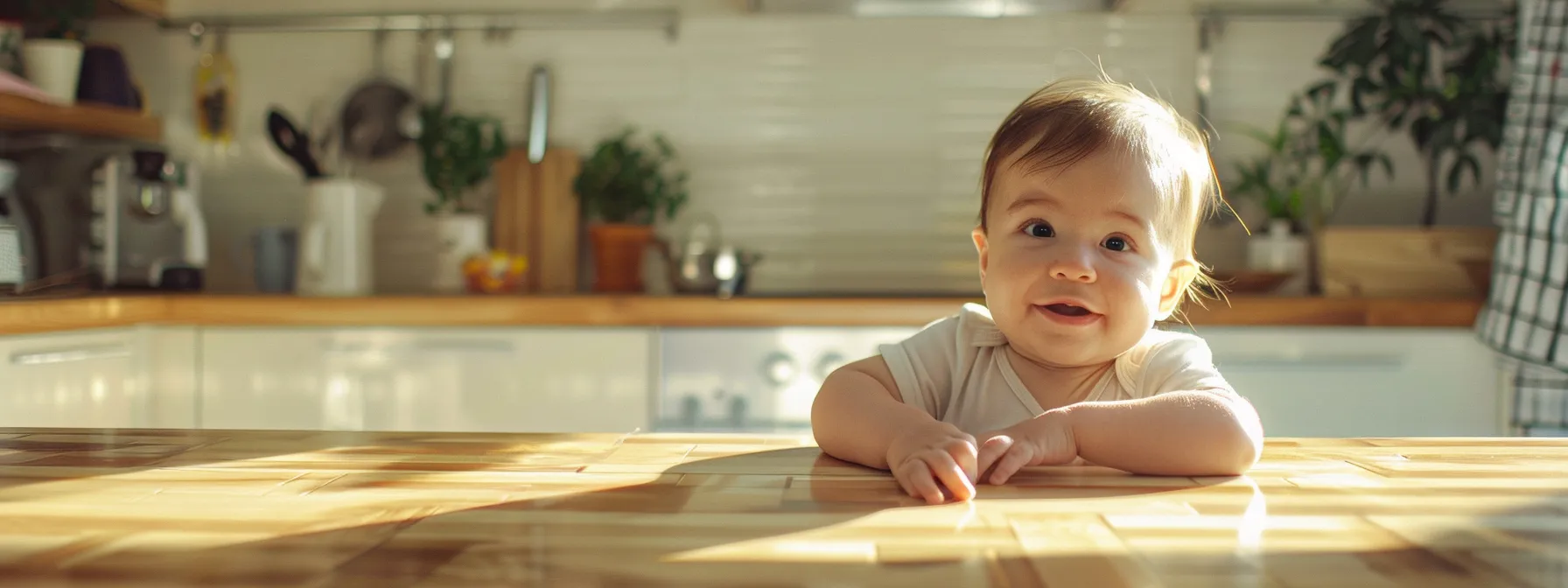
The choice of benchtop materials in your benchtop resurfacing kitchen renovation significantly affects both the environment and your living space. Understanding the environmental impact of traditional materials, like plywood and synthetic products, helps you recognize the importance of opting for sustainable kitchen countertops. Eco-friendly options can enhance indoor air quality through better ventilation while aligning your kitchen design with sustainable living values.
The Environmental Impact of Traditional Benchtop Materials
When considering your kitchen renovation, it’s essential to examine the environmental impact of traditional benchtop materials like granite and marble. These materials often require significant energy and resources for extraction and processing, leading to high consumption rates that can harm the planet. Additionally, the production of these heavy stones contributes to greenhouse gas emissions, which directly affects climate change.
Moreover, the use of sealants on stone surfaces can pose health risks. Many traditional sealants contain chemicals that can off-gas, affecting indoor air quality. By choosing eco-friendly alternatives, you can reduce harmful emissions and create a healthier cooking and living environment. You want to ensure that the materials you select not only look good but also support your health and the environment.
To make informed choices, explore options showcased on platforms like Houzz, where sustainable materials are increasingly featured. These resources highlight alternatives such as recycled materials and sustainable woods, demonstrating how you can achieve a beautiful kitchen while minimizing your ecological footprint. By opting for environmentally friendly benchtops, you contribute to protecting natural resources and promoting a sustainable lifestyle.
Benefits of Choosing Sustainable Kitchen Countertops
Choosing sustainable kitchen countertops allows you to make a positive impact on the environment. Options like bamboo and solid surface materials, including Corian, are not only aesthetically pleasing but also made from renewable resources. By selecting these environmentally friendly materials, you help minimize waste and reduce the carbon footprint associated with kitchen renovations.
In addition to being eco-conscious, sustainable countertops often offer durability and low maintenance. For example, stainless steel surfaces are resilient and resistant to heat and stains, making them a practical choice for busy kitchens. These durable options ensure that your renovations last longer while also reducing the need for replacements, which benefits both your budget and the environment.
Investing in sustainable materials can also enhance your indoor living environment. Many eco-friendly countertops contribute to better air quality by eliminating toxic emissions common in traditional materials. By prioritizing healthful choices, you not only create a beautiful kitchen but also ensure a safer space for your family, highlighting the important connection between design and well-being in your home.
How Eco-Friendly Benchtops Enhance Indoor Air Quality
Eco-friendly benchtops significantly improve indoor air quality by minimizing harmful emissions during and after manufacturing. Unlike traditional materials, which often contain volatile organic compounds (VOCs), sustainable options reduce these toxic risks. By selecting materials that emit fewer pollutants, you create a healthier cooking environment for your family.
Another key feature of eco-friendly countertops is their contribution to a lower carbon footprint. Many sustainable materials, such as bamboo, are derived from renewable sources, making them an excellent choice for eco-conscious homeowners. Opting for these products not only supports the environment but also aligns with your desire for a minimalist and functional kitchen design.
Moreover, using recyclable materials and environmentally friendly options helps to minimize your ecological footprint. By choosing benchtops that can be composted or repurposed, you contribute to a sustainable lifecycle of products while actively reducing waste. This choice reinforces your commitment to sustainable living and assures you have a space that reflects your values, which is essential for a modern kitchen.
- Eco-friendly materials reduce harmful emissions.
- Lower carbon footprint with renewable resources.
- Minimizes ecological footprint through compostable options.
- Aligns with minimalist and functional kitchen design.
- Supports sustainable living and reduces waste.
Aligning Kitchen Design With Sustainable Living
When you embrace sustainable design in your kitchen, you choose materials that not only look good but also contribute positively to the environment. Using responsibly sourced wood for your benchtops helps reduce wear and tear, ensuring longevity in your kitchen space. Additionally, selecting options that utilize resin or other eco-friendly materials enhances durability, giving you peace of mind that your renovation will stand the test of time.
Recycling plays a vital role in sustainable kitchen design. By incorporating recycled materials, such as reclaimed wood or repurposed surfaces, you help lessen the demand for new resources while minimizing waste. This approach not only benefits the environment but also adds unique character to your kitchen, making it a conversation starter and a true reflection of your commitment to sustainability.
Choosing eco-friendly benchtops allows you to align your kitchen with modern living standards focused on health and environmental responsibility. By prioritizing materials that reduce harmful emissions and promote a safer living environment, your kitchen becomes a sanctuary that reflects your values. As you invest in sustainable options, you enhance the overall functionality and aesthetic appeal of your culinary space, proving that style and sustainability can coexist seamlessly.
Now that you see why eco-friendly benchtops matter, let’s explore the materials that make them possible. Discover the top sustainable choices that can transform your kitchen into an environmentally friendly haven.
Top Sustainable Materials for Eco-Friendly Benchtops
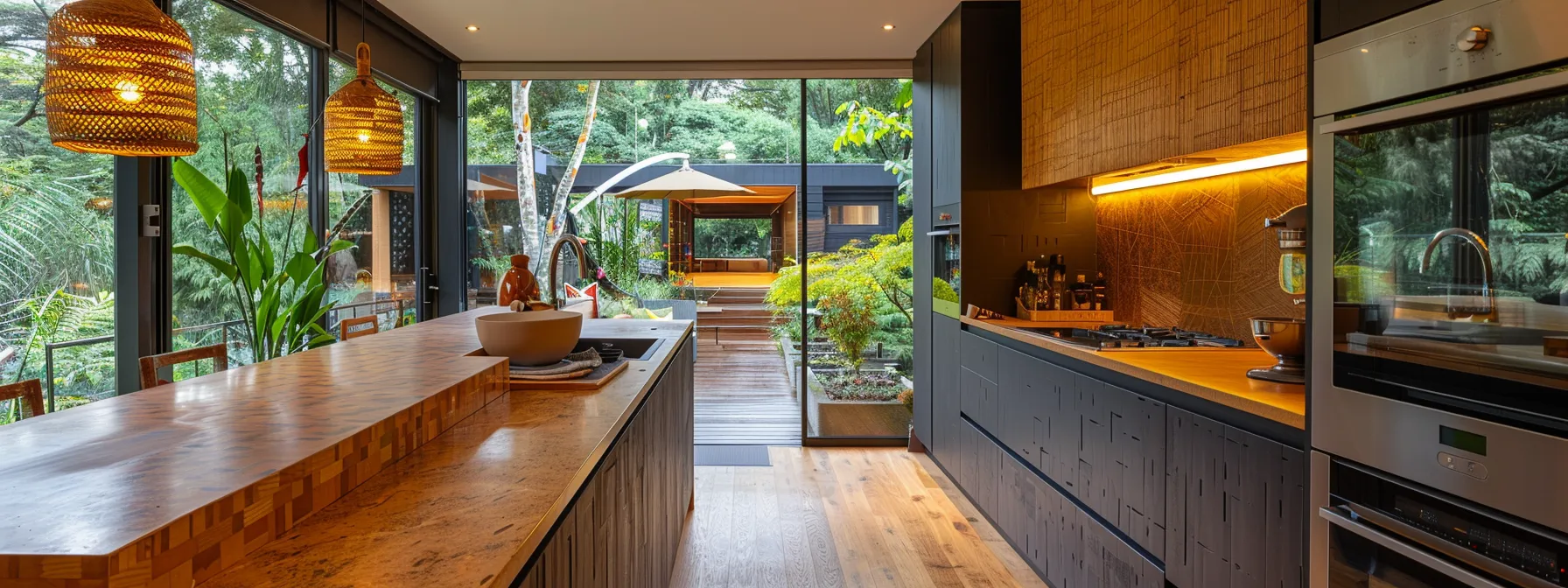
Top Sustainable Materials for Eco-Friendly Benchtops
Choosing the right materials for your kitchen benchtops can greatly affect both aesthetics and environmental impact. You’ll discover options like recycled glass countertops that combine beauty with sustainability, bamboo benchtops known for their renewability and style, and reclaimed wood countertops that breathe new life into old materials. Additionally, explore innovative paper composite surfaces and industrial chic recycled metal countertops, each offering unique benefits while minimizing your ecological footprint.
Recycled Glass Countertops: Beauty Meets Sustainability
Recycled glass countertops are an excellent choice for your kitchen renovation, blending beauty with sustainability. Made from post-consumer glass waste, these countertops are crafted in a way that reduces landfill contributions while showcasing vibrant colors and unique textures. You can create a stunning centerpiece for your cooking space, ensuring your cooktop area remains stylish and eco-friendly.
The durability of recycled glass countertops stands out as a significant benefit. They are resistant to scratches, stains, and heat, making them ideal for the demands of a busy kitchen. This long-lasting option allows you to enjoy a beautiful surface in your cooking area without worrying about frequent replacements, saving you both time and money in the long run.
Using recycled glass as a renewable resource underscores your commitment to sustainable living. By choosing these countertops, you not only enhance the aesthetic appeal of your kitchen but also contribute to a more responsible approach to home renovations. As you incorporate this sustainable material, you’ll feel good knowing you are making choices that support the environment while enjoying a stylish and functional kitchen space.
Bamboo Benchtops: Renewable and Stylish
Bamboo benchtops are a standout choice for your kitchen countertop due to their renewable nature and striking appearance. As a fast-growing grass, bamboo replenishes itself quickly, making it an ideal material that helps reduce the environmental impact associated with traditional wood sourcing. By choosing bamboo, you actively contribute to a more sustainable supply chain, lowering your home’s carbon footprint and supporting a healthier planet.
In terms of interior design, bamboo offers a unique aesthetic that can easily complement diverse styles, from modern to traditional. Its natural beauty, warm tones, and fine grain pattern bring a touch of elegance to your kitchen space. Furthermore, bamboo benchtops are resistant to stains, making them practical for cooking and food preparation, aligning both functionality and style in your kitchen renovation.
When considering kitchen renovations, environmental pollution should be at the forefront of your mind. Opting for bamboo reduces the reliance on harmful chemicals often found in synthetic alternatives, supporting a healthier living environment. By integrating this eco-friendly material into your design, you not only create a beautiful kitchen but also promote sustainability and responsibility within your home. Here are some key benefits of bamboo benchtops:
- Renewable resource that supports sustainability.
- Beautiful and versatile for various interior design styles.
- Stain-resistant and durable for practical use.
- Helps reduce environmental pollution.
- Contributes to a healthier home environment.
Reclaimed Wood Countertops: Giving Old Wood New Life
Reclaimed wood countertops are a sustainable choice for your kitchen renovation, showcasing the beauty of aged materials while providing an eco-friendly solution. By repurposing scrap wood from old buildings, barns, or furniture, you reduce the demand for new timber, which can help alleviate the strain on forests. When selecting reclaimed wood, look for products certified by the Forest Stewardship Council, ensuring responsible sourcing that prioritizes sustainable practices.
Using reclaimed wood not only minimizes the amount of plastic and engineered stone in your kitchen but also lowers the embodied energy associated with new materials. The energy required to harvest, process, and transport reclaimed wood is often significantly less than that of newly sourced timber, resulting in a smaller carbon footprint. This eco-conscious choice enhances your kitchen’s aesthetic while aligning with environmental values.
Incorporating reclaimed wood countertops into your kitchen design provides a unique character that new materials often lack. Each piece tells a story, adding warmth and charm to your space. By investing in these sustainable options, you contribute to a more responsible approach to renovations, ensuring that your kitchen is both beautiful and reflective of your commitment to protecting the environment.
Paper Composite Surfaces: Innovative and Durable
Paper composite surfaces stand out as an innovative choice for your kitchen benchtops, combining durability with eco-friendliness. Made from recycled paper and resin, these surfaces not only reduce waste, but are also non-toxic and free from harmful chemicals. When you choose paper composite, you can confidently create a functional kitchen cabinet area that is stylish and sustainable.
Unlike traditional materials such as quartz or butcher block, paper composite surfaces offer unique advantages. They are resistant to scratches and moisture, making them ideal for daily kitchen tasks, whether you are prepping food near the sink or placing hot pots. This durability ensures your investment stands the test of time, allowing you to focus more on cooking and entertaining rather than maintenance.
Additionally, paper composite surfaces come in a variety of colors and finishes, allowing you to customize your kitchen to match your design preferences. This versatility means they can easily complement other elements, such as cabinets and appliances, creating a cohesive look. By opting for these surfaces, you not only enhance the aesthetics of your kitchen but also align with sustainable practices, supporting a healthier environment for yourself and future generations.
Recycled Metal Countertops: Industrial Chic With a Green Touch
Recycled metal countertops offer a stunning blend of industrial chic style and eco-conscious living for your kitchen. By utilizing reclaimed steel, you significantly reduce the use of fossil fuels typically needed to produce new steel, making it an eco-friendly alternative. This choice not only enhances the aesthetic of your kitchen but also contributes to a more sustainable lifestyle by embracing the practice of reuse.
Incorporating recycled metal surfaces into your pantry or kitchen area can streamline your design while showcasing unique textures and finishes. These countertops are incredibly durable and resistant to heat and scratches, making them ideal for high-traffic cooking spaces. Whether paired with wooden cabinetry or modern fixtures, the robust nature of recycled steel ensures that you have a long-lasting and stylish solution for your home.
Additionally, the versatility of recycled metal allows various combinations with materials like clay and wood, giving you the opportunity to personalize your kitchen further. You can create a contemporary look while supporting sustainable practices. By choosing recycled metal countertops, you demonstrate a commitment to responsible sourcing and environmental stewardship, making your kitchen not just beautiful but also a reflection of your values.
You know the materials that hold promise for a greener kitchen. Next, let’s look at what really matters when picking the right sustainable benchtop for your space.
Factors to Consider When Choosing Sustainable Benchtops
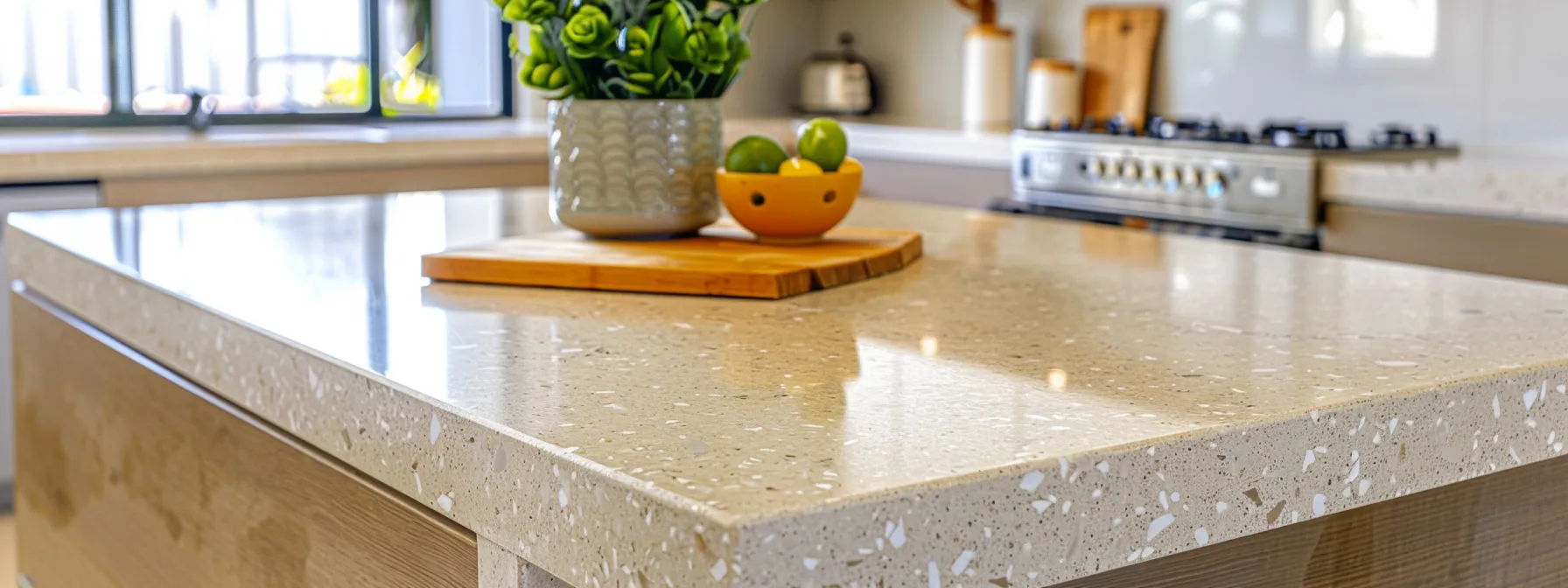
When selecting sustainable benchtops for your kitchen renovation, you should consider several key factors. Assess the durability and maintenance needs of materials such as Caesarstone that align with your lifestyle. Evaluate environmental certifications and standards to understand the carbon footprint and water efficiency of your choices. Think about how the aesthetic fit of your benchtops complements your kitchen design, while also budgeting for eco-friendly materials. Additionally, sourcing materials locally can significantly reduce your overall carbon impact.
Assessing Durability and Maintenance Needs
When selecting sustainable benchtops for your kitchen, assessing durability is crucial. You want materials that can withstand daily use while maintaining their appearance over time. Options like recycled glass and bamboo offer impressive resilience, providing surfaces that resist scratches and stains, allowing you peace of mind as you cook and entertain.
Maintenance needs also play a significant role in your decision-making process. Choosing materials that are easy to clean and require minimal upkeep ensures your kitchen remains functional without excessive effort. For example, surfaces like stainless steel and paper composite not only stand up well against wear but also simplify cleaning, making them practical choices for busy households.
Finally, consider how the durability and maintenance of your chosen materials align with your lifestyle. If you frequently cook or host gatherings, materials that endure high traffic and are easy to maintain can enhance your kitchen experience. By thoughtfully choosing durable, low-maintenance options, you can enjoy a beautiful and functional kitchen that supports your sustainable living goals.
Evaluating Environmental Certifications and Standards
When evaluating sustainable benchtop options for your kitchen, start by looking for environmental certifications. These certifications, such as the Forest Stewardship Council (FSC) and Greenguard, indicate that the materials meet specific sustainability standards. They can help you choose products that minimize environmental impact while ensuring safety and quality for your home.
Another important aspect is understanding the carbon footprint of the materials you consider. Look for products that provide transparency in their sourcing and manufacturing processes. Many suppliers are willing to share details about their environmental practices, which can guide you in making informed decisions that align with your eco-friendly renovation goals.
Finally, consider the water efficiency of the materials you choose. Some sustainable benchtop options require less water in their production processes, which is a crucial factor in protecting water resources. By prioritizing materials with low water usage, you contribute to sustainable practices in your kitchen renovation, while also enhancing its overall efficiency.
Considering Aesthetic Fit With Your Kitchen Design
When designing your kitchen, considering the aesthetic fit of sustainable benchtops is essential. Choose materials that enhance your overall kitchen design, creating a harmonious look that reflects your personal style. For instance, a sleek bamboo benchtop can blend seamlessly with modern cabinetry, while reclaimed wood can add warmth to a rustic kitchen setting.
Think about how the color, texture, and pattern of your chosen benchtop will work with other elements in your kitchen, such as the flooring and backsplash. If you prefer a minimalist design, a paper composite surface with a smooth finish may complement your vision perfectly. Alternatively, consider recycled glass countertops if you want a vibrant centerpiece that adds character to your kitchen.
As you select your eco-friendly benchtops, keep in mind the long-term style and functionality you desire. A well-chosen benchtop not only serves its practical purpose but also elevates the overall aesthetic of your kitchen. By investing in materials that align with your design preferences, you create a cohesive and inviting space that showcases your commitment to sustainability.
Budgeting for Eco-Friendly Benchtop Materials
When budgeting for eco-friendly benchtop materials, it’s important to research the costs associated with various sustainable options. Many green materials, like bamboo or recycled glass, may have a higher upfront cost compared to traditional materials. However, consider the long-term savings from reduced maintenance and potential energy efficiency gains, which can offset the initial investment over time.
Be transparent about your budget and prioritize the materials that align best with your sustainability goals and aesthetic preferences. Keep in mind that selecting locally sourced materials can not only reduce shipping costs but also support your local economy. Engaging with suppliers who specialize in eco-friendly options can help you uncover discounts or alternative materials that fit within your financial plan.
As you narrow down your choices, think about how each option fits into your overall kitchen renovation budget. Allocate funds not only for the benchtops but also for installation, as some sustainable materials may require specialized craftsmanship. By planning carefully and being mindful of costs, you can create a stunning and environmentally friendly kitchen that fulfills your vision while adhering to your financial limits.
Sourcing Materials Locally to Reduce Carbon Footprint
Sourcing materials locally for your eco-friendly benchtop renovation is a practical way to reduce your carbon footprint. When you choose locally sourced options, you minimize transportation emissions, which significantly contributes to environmental pollution. You’ll also support local economies, fostering sustainable practices within your community while obtaining high-quality materials tailored to your region’s aesthetics.
Local suppliers often offer unique materials that align with sustainable living principles, such as reclaimed wood or recycled glass. By engaging with these businesses, you can find products that not only meet your design preferences but also tell a story connected to your area. This adds character to your kitchen while reinforcing your commitment to eco-friendly practices.
Additionally, sourcing materials locally allows you to forge relationships with suppliers who value sustainability. You can gain insight into the entire sourcing and production process, ensuring that the materials you choose are environmentally friendly. This transparency gives you peace of mind knowing that your renovation supports both healthy living and responsible environmental stewardship.
Choosing the right sustainable benchtop is only the beginning. Next, learn how to install these materials to ensure they last and look great in your space.
Installation Tips for Sustainable Benchtop Materials
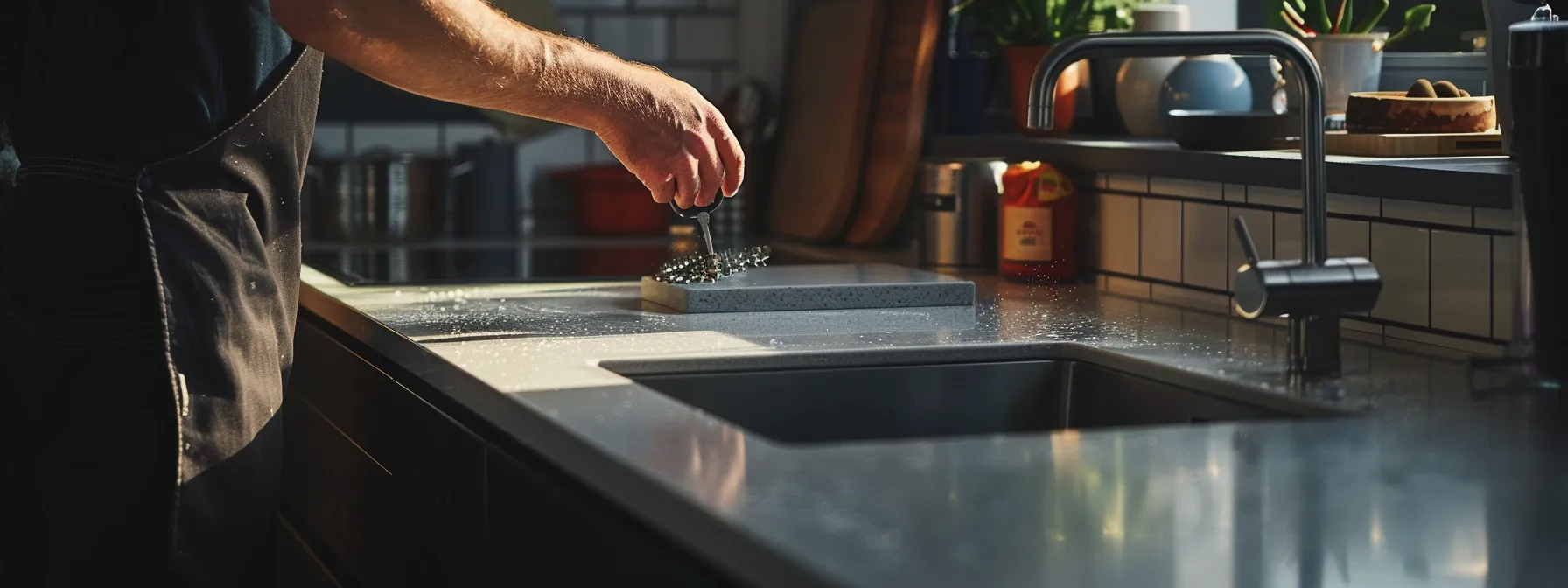
Finding skilled installers familiar with eco-friendly materials is critical for a successful benchtop renovation. Proper preparation of your kitchen will ensure a smooth installation process. Additionally, consider ways to minimize waste during installation and how to safely dispose of or recycle old benchtops. Each of these steps contributes to creating a sustainable kitchen environment that aligns with your values.
Finding Skilled Installers Familiar With Eco-Friendly Materials
Finding skilled installers who are well-versed in eco-friendly materials is essential for your kitchen renovation. Look for professionals who specialize in sustainable benchtop installation and have experience with materials like bamboo, recycled glass, and reclaimed wood. They should not only understand the unique characteristics of these materials but also be able to highlight their benefits to ensure you achieve the best outcome for your project.
Ask potential installers about their familiarity with specific eco-friendly materials and their installation techniques. A knowledgeable installer will be able to provide insights into handling these materials properly, ensuring durability and longevity in your kitchen. Requesting references or seeing previous projects can give you a better idea of their expertise and craftsmanship in working with sustainable options.
Additionally, consider engaging installers who prioritize sustainability in their practices. This may include minimizing waste during installation and responsibly disposing of old materials. By choosing a skilled installer with a commitment to eco-friendly practices, you ensure that your kitchen renovation aligns with your values while receiving quality craftsmanship that enhances your living space.
Preparing Your Kitchen for a Smooth Renovation
Preparing your kitchen for a smooth renovation involves careful planning and organization. Start by clearing out all items from your kitchen countertops and cabinets to create a clean workspace for the installers. This not only facilitates easier access to areas requiring attention but also reduces the risk of damage to your belongings during the installation of your eco-friendly benchtops.
Next, assess the current condition of your kitchen. Check for any existing damage, such as plumbing leaks, electrical issues, or structural concerns, which should be addressed before installing new sustainable materials. By taking the time to rectify these problems beforehand, you ensure that your renovation proceeds seamlessly and that your new benchtops are installed in a safe and supportive environment.
Finally, coordinate with your chosen installer to establish a timeline that works for both parties. Clear communication is vital to ensure that all steps in the renovation process are understood. Discuss installation details, including how long the project will take and any preparations you need to make, to minimize disruptions and create a positive experience as you transform your kitchen with sustainable benchtops.
Minimizing Waste During Installation
Minimizing waste during the installation of your eco-friendly benchtops is crucial for maintaining sustainability in your kitchen renovation. One effective strategy is to work closely with your installers to develop a detailed plan, ensuring that they measure materials accurately and cut them thoughtfully. This approach reduces offcuts and excess materials, allowing you to make the most of your sustainable choices.
Consider reusing any existing materials wherever possible, as this not only cuts down on waste but can also add character to your kitchen. For instance, salvaged items from your old benchtops can be repurposed for decorative features or additional storage solutions. By integrating these elements, you enhance your kitchen’s aesthetic while staying true to sustainable practices.
Finally, it’s beneficial to establish a plan for the proper disposal or recycling of any leftover materials after installation. Many local recycling centers accept materials like wood, metal, and glass, allowing you to divert waste from landfills. By proactively addressing the end-of-life phase for your materials, you further solidify your commitment to eco-friendly living while creating a beautiful and functional kitchen space.
Safely Disposing or Recycling Old Benchtops
When you replace your old benchtops, it’s important to dispose of them responsibly. Start by checking with your local waste management facility for guidelines on how to safely dispose of materials like wood, laminate, or stone. Many recycling centers accept these materials, ensuring that they do not end up in a landfill.
Consider reusing parts of your old benchtops for new projects in your kitchen or home. For instance, pieces of wood can be repurposed into shelves, decorative accents, or even new cutting boards. This not only gives your old materials a new lease on life but also supports a sustainable approach to home renovations.
Finally, organizing a community exchange can be a great way to recycle your old benchtops. You can offer them for free to others who might want to use the materials for their projects. This practice fosters community spirit while helping you declutter your space:
- Check local recycling facilities for material disposal guidelines.
- Repurpose old benchtops for creative home projects.
- Engage your community by exchanging materials for reuse.
Installing your sustainable benchtops is just the beginning. Next, you’ll want to know how to care for and maintain them, ensuring they stay beautiful and last a long time.
Caring for and Maintaining Your Eco-Friendly Benchtops
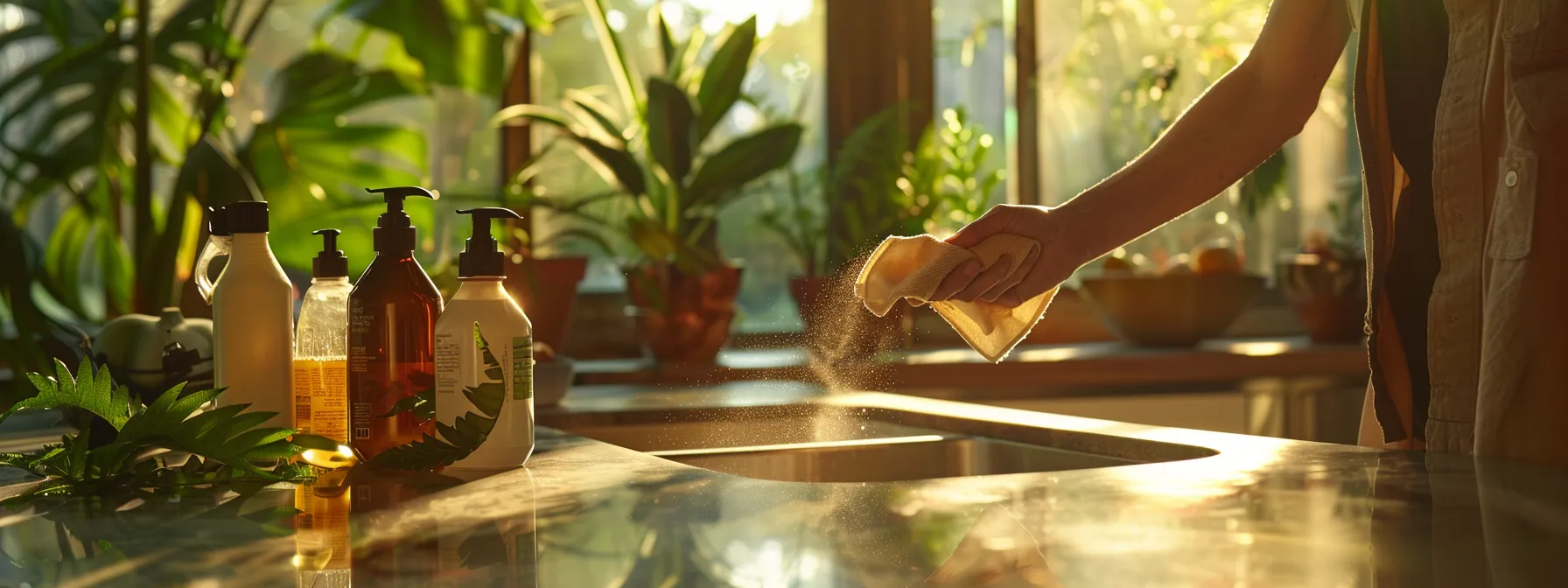
Caring for and maintaining your eco-friendly benchtops is crucial to ensuring their longevity and appeal. You will learn recommended cleaning practices for sustainable surfaces, ways to protect your benchtop from daily wear, and how to repair minor damages to extend the lifespan of your materials. Additionally, you will discover eco-friendly cleaning products to use that align with your sustainable living values.
Recommended Cleaning Practices for Sustainable Surfaces
To maintain the beauty and integrity of your eco-friendly benchtops, using the right cleaning practices is essential. Begin with a simple warm water solution mixed with a few drops of mild dish soap. This method effectively cleans most surfaces without causing damage, ensuring your sustainable materials remain safe and vibrant.
Avoid harsh chemicals that can harm your eco-friendly surfaces and the environment. Instead, consider using natural alternatives like vinegar or baking soda for tougher stains. These options are not only safe for your benchtops but also minimize harmful chemical exposure in your kitchen, creating a healthier cooking environment.
Regularly wipe down your benchtops with a soft cloth to prevent dirt and grime buildup. Make it a habit to clean up spills immediately to avoid any potential damage. By following these straightforward practices, you will extend the life of your sustainable surfaces and maintain a clean, inviting kitchen space:
- Use warm water and mild dish soap for regular cleaning.
- Avoid harsh chemicals and opt for natural cleaning solutions.
- Wipe down surfaces regularly to prevent buildup.
- Clean spills immediately to maintain surface integrity.
Protecting Your Benchtop From Daily Wear
To protect your eco-friendly benchtops from daily wear, you need to establish a routine that emphasizes care and maintenance. Use cutting boards and trivets to avoid scratches and heat damage. Doing so will ensure that your surfaces maintain their beauty while enduring the continuous demands of your kitchen activities.
It’s also essential to clean your benchtops regularly to prevent the buildup of dirt and grime. Selecting non-abrasive sponges and mild soaps will help you maintain the integrity of your eco-friendly surfaces. Implementing a weekly cleaning schedule can significantly extend the lifespan of your materials, keeping them looking fresh and new.
Additionally, avoid exposing your benchtops to harsh chemicals or high moisture. For instance, wiping spills immediately with a soft cloth helps prevent stains and water damage. By taking these simple precautions, you create a durable and beautiful kitchen environment that reflects your commitment to sustainable living:
Repairing Minor Damages to Extend Lifespan
Repairing minor damages on your eco-friendly benchtops doesn’t have to be a daunting task. If you notice scratches or small dents, consider using a food-safe wood filler or a non-toxic resin to fill the void. This approach not only restores the surface’s appearance but also maintains the integrity of your sustainable materials.
For stains that may affect the finish of your benchtop, gently cleaning the affected area with a solution of vinegar and water can often do the trick. Be sure to test any cleaning method on a small, inconspicuous area first. This helps you ensure that the repair won’t cause further damage and keeps your kitchen looking pristine.
Lastly, regular maintenance is key to extending the lifespan of your eco-friendly materials. Applying a thin layer of natural oil or wax can enhance their durability and protect against future wear. This simple practice not only serves to beautify your benchtops but also reinforces your commitment to sustainable living, creating a healthier environment for you and your family.
Eco-Friendly Cleaning Products to Use
Using eco-friendly cleaning products is vital for maintaining your sustainable benchtops while ensuring a safe and healthy kitchen environment. You can opt for natural solutions such as vinegar and baking soda, which effectively tackle grime and stains without the harmful chemicals found in conventional cleaners. These options not only protect the integrity of your eco-friendly materials but also promote a healthier indoor air quality for your family.
One popular choice for environmentally conscious homeowners is castile soap, a vegetable-based soap that works well on various surfaces, including bamboo and recycled glass. Simply mixed with warm water, it provides an effective and gentle cleaning solution that won’t damage your benchtops. Incorporating castile soap into your cleaning routine ensures that your surfaces remain fresh and clean while adhering to your commitment to sustainability.
It’s essential to read labels carefully and choose cleaning products that are certified as eco-friendly. Look for formulations that are biodegradable, non-toxic, and free from fragrances and synthetic dyes, as these can negatively impact indoor air quality. By prioritizing eco-friendly cleaning products, you contribute to the longevity of your sustainable benchtops and support your overall goal of creating a green home environment:
- Choose natural solutions like vinegar and baking soda for safe cleaning.
- Use castile soap mixed with warm water for effective surface cleaning.
- Look for certified eco-friendly products to ensure safe ingredients.
Your eco-friendly benchtops deserve more than care; they deserve to shine in real spaces. Let’s look at some inspiring transformations that showcase the beauty and practicality of eco-friendly renovations.
Real-Life Examples of Eco-Friendly Benchtop Renovations
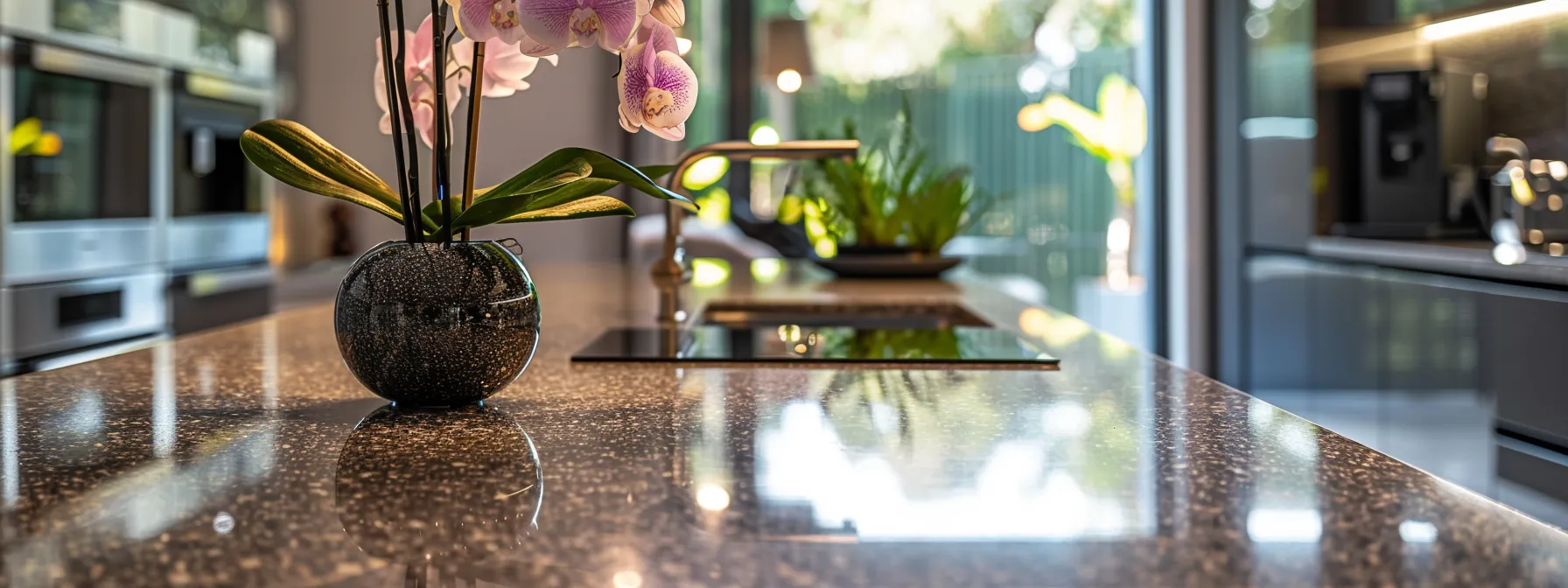
Transform your kitchen with inspiring real-life examples of eco-friendly benchtop renovations. Discover how homeowners embraced recycled glass countertops to achieve stylish, sustainable designs, and gain insights on the latest sustainable benchtop trends. Explore engaging homeowner stories highlighting the benefits of choosing eco-friendly options, and see the visual impact of renovations through striking before-and-after images.
Transforming a Kitchen With Recycled Glass Countertops
Recycled glass countertops have become a popular choice for homeowners seeking to create stylish and eco-friendly kitchens. When you choose these surfaces, you not only add a vibrant element to your kitchen design, but you also contribute to reducing waste. For instance, a recent renovation in a Melbourne home featured stunning recycled glass countertops, showcasing how sustainable materials can enhance the overall aesthetic while promoting environmental responsibility.
In this renovation, the combination of colorful recycled glass and a sleek design transformed the kitchen into a focal point of the home. The homeowners expressed satisfaction with the unique textures and vibrant colors that recycled glass provides, elevating their cooking space. Furthermore, the durability of these countertops ensures they withstand daily kitchen activities, catering to your need for functionality alongside beauty.
To integrate recycled glass countertops into your kitchen renovation, consider sourcing them from local suppliers who specialize in sustainable materials. Engaging with knowledgeable professionals will help you explore various styles and options available, ensuring you find a solution that aligns with your personal preference. Here are some steps that illustrate the transformation process:
- Research local suppliers for recycled glass products.
- Select colors and textures that complement your kitchen style.
- Work with professional installers experienced in eco-friendly materials.
- Enjoy a vibrant, durable, and beautiful kitchen space.
Insights on Sustainable Benchtop Trends
Sustainable benchtop trends are increasingly focusing on materials that balance aesthetics and environmental responsibility. You’ll find that options like recycled glass and bamboo have gained popularity not only for their visual appeal but also for their eco-friendly properties. Incorporating these materials in your kitchen enhances the overall look while actively reducing your carbon footprint.
Another trend in sustainable benchtops is the use of reclaimed wood, which adds character and warmth to your kitchen. Opting for these materials can help minimize waste and support responsible sourcing practices. You have the opportunity to choose unique pieces that tell a story, ultimately making your kitchen a space that reflects both style and your commitment to sustainability.
Moreover, innovation in surface materials, such as paper composite surfaces and recycled metal, showcases the versatility available for eco-friendly kitchen designs. These trendy options marry practicality with sustainability, allowing you to create a functional workspace that is also environmentally conscious. By choosing these materials, you demonstrate a dedication to modern design and responsible living, aligning your kitchen renovation with current sustainable practices:
Homeowner Stories: Choosing Eco-Friendly Options
When homeowners like Sarah and James decided to renovate their kitchen, they focused on making eco-friendly choices for their benchtops. They opted for recycled glass countertops that added a pop of color and texture to their space while effectively reducing waste. Not only did these sustainable materials enhance their kitchen’s aesthetic, but they also aligned with their values of environmental responsibility.
Another inspiring example comes from their neighbor, Lisa, who chose bamboo for her kitchen benchtops. This fast-growing resource provided a warm and inviting look, fitting perfectly within her modern décor. Lisa appreciated that bamboo is renewable, which not only helped minimize her carbon footprint but also allowed her to create a beautiful kitchen that reflects her commitment to sustainable living.
Homeowners consistently find that choosing eco-friendly materials for benchtops brings both style and functionality. As you consider options for your renovation, think about how these materials can support your vision:
Visual Impact: Before and After Renovations
The visual impact of your kitchen can be dramatically transformed through eco-friendly benchtop renovations. Many homeowners report significant changes in their kitchen’s aesthetics after switching to sustainable materials like bamboo or recycled glass. These options not only enhance the overall appearance but also reflect a commitment to environmental responsibility.
For instance, consider a renovation that replaced outdated laminate surfaces with sleek recycled glass countertops. The vibrant colors and unique textures of the new material create a striking focal point in the kitchen, elevating its style and ambiance. Homeowners often express delight at how the updated look improves both functionality and the enjoyment of their cooking space.
By embracing sustainable options, you not only improve the visual appeal of your kitchen but also address modern design trends that prioritize eco-friendliness. This transformation often encourages conversations about sustainability and design among family and friends, reinforcing your choice to invest in environmentally-friendly renovations. Ultimately, these changes offer a beautiful kitchen that meets your needs while aligning with your values.
